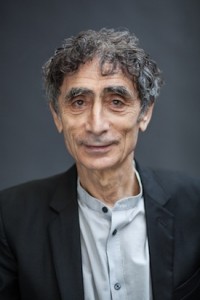A screenshot of Dr. Gabor Maté and Rita Bozi in The Damage is Done, from video by Patrick McLaughlin.
The Cultch often presents non-traditional shows that confront uncomfortable questions. This year, one such show, The Damage is Done by Rita Bozi, brings to the stage an examination of trauma and its psychological impact on individuals and families.
The Damage is Done combines theatre, dialogue, essay, video, music and dance. It features two performers: Bozi, and physician and author Dr. Gabor Maté, who has written on various psychological issues, including addiction. Bozi plays several characters in the show, while Maté plays himself.

“I comment on Rita’s actions on stage, like a Greek chorus,” Maté said in an interview with the Independent. “We are trying to find some meaning to the trauma endured in the past, the traumas our families went through, and to learn from it. If we don’t process trauma, it will control our lives. The after-effects of trauma influence how we see ourselves: either as victims, or it makes us overcompensate, try to appear more powerful than we are. Sometimes, people try to get away from the pain with drugs – that’s where addiction comes from.”
Maté explained that deep trauma is often transmitted through generations. It affects social units and families as well as individuals. “The children of Holocaust survivors often have elevated stress hormone levels. When a young mother is depressed, her baby suffers, even though everyone loves the baby and nobody wants it hurt…. The play is an exploration of how trauma works and how we can find liberation from it. Before we heal, we must find the problem, acknowledge it.”
He accepted this project despite a busy schedule and multiple speaking engagements because it touches on issues about which he has been advocating for years. “Medical schools don’t teach students about trauma and its psychological impact. When the young doctors start working, they feel the lack of that knowledge. They want a guidance of how to connect physical and emotional healing, and not many people talk about the subject.”
So, many professionals turn to Maté. His seminars are in such demand across North America that sometimes he spends days on the road. “In the last week, I had eight speaking engagements,” he said. In various American and Canadian cities, addiction workers, trauma specialists, therapists and educators, as well as family members and others, comprise Maté’s audience.
“I’m trying to answer the question, ‘Why?,’ the same question Rita asks in her play, so I provide the framework for her story. I think it’s very important. So many people suffer from trauma, physical and psychological. It’s impossible to separate the two. I’m not going to launch a second career as an actor, of course,” he added with a smile, “but it was an interesting challenge, something different. Besides, I like Rita.”
Bozi also spoke with the Independent. She explained that the show was years in development. Its most recent version premièred in Yukon last year. “This show is ultimately about compassions for ourselves and others,” she said.
Maté’s involvement in the project was paramount to her. “I attended several workshops with Gabor and I read his books. He once said, ‘We need to be asking not why the addiction but why the pain?’ As a therapist and a child of immigrant Hungarian parents who lived through the war, the Soviet occupation and the revolution, I have long been concerned with inherited historical trauma and its effect on families and offspring.”
She continued, “I wanted Gabor a part of it. Why mention him if I could have him? I had already been making a connection with Gabor through email over our shared Hungarian backgrounds…. He felt like kin. We were speaking the same language (apart from Hungarian) and we both felt the power of the mind-body connection affecting our lives.”
It took Bozi 12 years from the seed of the idea to the show itself. “I play out my family drama, and Gabor plays the poetic counterpoint. He helps my character come back to ‘self.’ He helps her understand her own experience of the family situation, her part in it and how to begin to transform the inherited pain. He brings his razor-sharp insights to the show and his ability to be concise about what is happening. He sees what is hidden, cuts to the chase and helps guide one to the pieces of self that were lost when trauma occurred.”
According to Bozi and Maté, healing comes from the ability to look at traumatic events from infancy and early childhood with humor and compassion – even though the damage is done, we can defuse its impact.
The Damage is Done will be performed at the Cultch from Oct. 20-24. Before that, Bozi and Maté are taking the show to Banff, where both their evening shows are already sold out. For more information about the local production, visit thecultch.com/events/the-damage-is-done-a-true-story.
Olga Livshin is a Vancouver freelance writer. She can be reached at olgagodim@gmail.com.

